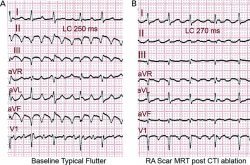


Substances that may contribute to atrial flutter include: Chronic obstructive pulmonary disease ( COPD ): A condition that lowers the amount of oxygen in your blood.Pulmonary embolism : A blood clot in a blood vessel in the lungs.Hyperthyroidism: An overactive thyroid gland.Hypertrophy: An enlarged chamber of the heartĭiseases elsewhere in your body that affect the heart include:.Abnormal heart valves: Especially the mitral valve.Cardiomyopathy: Disease of the heart muscle.Ischemia : Lower blood flow to the heart due to coronary heart disease, hardening of the arteries, or a blood clot.Heart diseases or problems that can cause atrial flutter include: Substances that change the way your heart transmits electrical impulses.A disease elsewhere in your body that affects the heart.Diseases or other problems in the heart.In some people, no root cause is ever found. You're more likely to get this condition if you've had:ĭoctors don’t always know. Persistent atrial flutter is more or less permanent. An episode of atrial flutter usually lasts hours or days. Paroxysmal atrial flutter can come and go. Complications of atrial flutter can be devastating, but treatment almost always prevents them. With proper treatment, atrial flutter is rarely life-threatening. Congestive heart failure, heart attack, and stroke can result.Vital organs like the heart muscle and brain may not get enough blood, which can cause them to fail.The main danger with atrial flutter is that your heart doesn’t pump blood very well when it beats too fast. Because atrial flutter comes from the atria, it is called a supraventricular (above the ventricles) tachycardia. It usually slows the beats by a fourth or a half, or down to somewhere between 150 and 75 beats per minute.Īn abnormally fast heart rate is called tachycardia. The beat slows down when the signals reach the AV node, a bundle of cells in the upper wall of muscle between the ventricles, your heart’s lower chambers. A normal heartbeat is 60-100 beats per minute. It beats extra fast, about 250-400 beats per minute. Atrial flutter results from an abnormal circuit inside the right atrium, or upper chamber of your heart. Sometimes the signals cause it to go awry. Your heartbeat is a sort of electrical circuit. Such problems, whether in the rhythm or speed of the heartbeat, are known as arrhythmias. Atrial flutter is a problem with the way your heart beats.


 0 kommentar(er)
0 kommentar(er)
